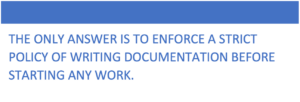Sources of Tribal Knowledge
In the workplace, “tribal knowledge” is jargon for unwritten information that is not commonly known, but is required to build a product or service within an organization (i.e. the tribe). Tribal knowledge can be useful and really make an organization unique. However, all too often this knowledge falls into the hands of sub-tribes that control the information and can be as small as just one person. Now the business is at risk. Sometimes it happens by accident; for example, a business process becomes the responsibility of one group or division within an organization. Other times it’s because Johnny “job security” wants as sense of protection by stockpiling tidbits of information only they have access too. One doesn’t have to look hard to find literature on the dangers of tribal knowledge. Two specific methods, “mentor up mentality” and “pre-documentation” have proven very successful at mitigating the danger.
Mentor up Mentality
In ideal job environment employees are put in a position where they are mentored by leader-managers they report too. These leader-managers guide the careers of those in their immediate sphere with the intent that those same people become the leader manager’s replacement. The mentor-up objective is to create a culture where employees constantly look for ways to share their knowledge with others.
 The challenge here is instill the idea that an employee should work to make themselves totally replaceable at any time. Not an easy sell for sure, but let’s take inventory of the benefits to the individual. Take for example an organization that has a critical software process that only one helpdesk employee, Betty, knows. Betty’s critical. Betty’s a rock star, and Betty’s hard to replace. The organization can’t easily transition Betty’s role, and Betty knows it. However, Betty is also hard to promote. Betty can never really grow in the organization until her knowledge is mentored to others. By taking an approach of knowledge sharing the organization is protected, and so too is Betty.
The challenge here is instill the idea that an employee should work to make themselves totally replaceable at any time. Not an easy sell for sure, but let’s take inventory of the benefits to the individual. Take for example an organization that has a critical software process that only one helpdesk employee, Betty, knows. Betty’s critical. Betty’s a rock star, and Betty’s hard to replace. The organization can’t easily transition Betty’s role, and Betty knows it. However, Betty is also hard to promote. Betty can never really grow in the organization until her knowledge is mentored to others. By taking an approach of knowledge sharing the organization is protected, and so too is Betty.
Examining this more closely, we see that tribal knowledge all too often is found in rarely used business processes. General speaking the retention of knowledge in unused processes can be very short. A rarely used business process
 coupled with employee turnover can make what should have been a simple process into a time-consuming emergency. We’ve all been in situations where an extremely well-designed business process or software solutionworks well until one bad day it doesn’t. When not properly documented and shared with others what would have taking minutes to fix can take hours or days to reverse engineer. Well designed and thought-out documentation can keep that those evitable corrections quick and painless.
coupled with employee turnover can make what should have been a simple process into a time-consuming emergency. We’ve all been in situations where an extremely well-designed business process or software solutionworks well until one bad day it doesn’t. When not properly documented and shared with others what would have taking minutes to fix can take hours or days to reverse engineer. Well designed and thought-out documentation can keep that those evitable corrections quick and painless.
Pre-Documentation
While seemingly obvious, documentation is often the most overlooked aspect to avoiding the dangers of tribal knowledge. There is rarely time for the organization to notice and write up comprehensive documentation on a newly created worked flow, interface, or software system. For most, writing up documentation is terribly boring, tedious and outside their comfort zone. The only answer is to enforce a strict policy of writing documentation before starting any work.
Essentially this becomes pre-documentation. There are a couple hidden benefits here. Anything too complicated to document well is often too complicated to implement successfully. Probably the single most telling predictor of project success is a well-documented workflow. If a process or software solution can’t be documented in an easy-to-understand workflow, then there is a risk for project failure later. Basically, the business is using pre-documentation as key indicator of whether the foundation of a new process is sound. Another benefit is at the end of project all that really remains is final tweaking of the documentation that was written before the project started. It far easier update a well-written pre-document than it is to start from a blank page. The result is a thoroughly thought out and designed system that is well documented and can be easily supported by future generations.
Knowledge is Power
Tribal knowledge is a real danger to organization. Knowledge is power, but the reality is unwritten knowledge doesn’t hang around very long. By failing to capture this information and make it easily available the speed and productivity of these organizations can negatively impact. Invest in your employees and the organization by creating a culture were mentoring up and pre-documentation are routine and expected ways to conduct business. Employees should be highly encouraged and maybe even financially motivated to document those “tricks of the trade” that make the organization the unique. Tribal knowledge can be dangerous but there are steps a CFO can take to protect the organization.

Mel Heckman is an accomplished operations and technology executive with nearly 30 years’ experience in ERP, IT infrastructure, custom development, and Business Intelligence across a wide range of industries, particularly manufacturing and distribution. Mel has developed a deep expertise in information technology planning, architecture, and operations.




